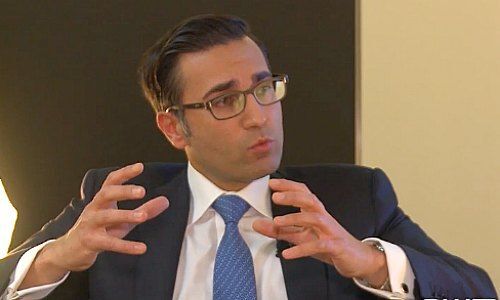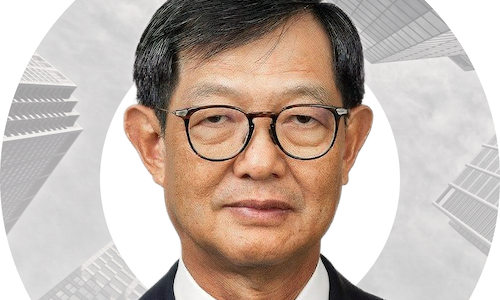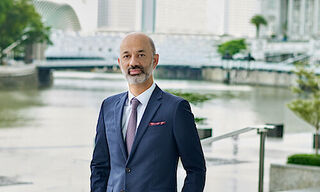With its recent leadership reshuffle, UBS is charting new paths to identify a successor for its present CEO Sergio Ermotti, finews.com believes.
Late last week, on Thursday, UBS announced far-reaching changes at the top of its executive ranks. The promotion of Iqbal Khan and Rob Karofsky puts two frontrunners in the driver's seat as potential future CEOs, something that gives the step certain strategic characteristics while effectively quelling speculation about the selection process.
Another thing that it does is to make it clear that the next top executive at the bank is probably going to come from inside its ranks. As of now, both candidates will be competing to succeed current UBS CEO Sergio Ermotti, with the outcome of that rivalry likely being a decisive factor in determining who is genuinely qualified to lead.
Stepping Up
Both frontrunners have never led a bank, which means that they still have to go some way to prove themselves capable. The reshuffle announced last week gives Khan and Karofsky additional responsibilities, and it is a step that will help them better meet the profile needed to run a global bank. Given that, it is too simplistic to interpret their expanded roles as just another step up or down the corporate ladder.
Looking at it objectively, Karofsky has gained substantial influence, even power, given he is now co-head of Global Wealth Management (GWM). His primary area of responsibility is the crucial Americas business, and if everything goes well, he will be in a strong position to make the jump in a few years.
Where the Action Is
But Khan’s new role is just as significant. Although he is no longer the sole head of the GWM division, he has been given leadership of the burgeoning Asia Pacific market. Moving to Singapore with his family in tow shouldn't be seen as a demotion but more as a commitment to work in a dynamic financial landscape, and a place with significant industry growth and innovation.
Asia leads the world when it comes to trends such as digitalization, fintech, blockchain, cryptocurrencies (DeFi), artificial intelligence, using machine learning for fraud detection, cybersecurity, customer engagement, sustainability, climate risk management, and financial inclusion. Beyond that, various tech platforms, open banking, and omnichannel strategies are crucial efficiency drivers in Asia’s banking sector.
Broadening Perspective
Khan’s role offers a diverse and rich learning experience, which will significantly enhance his professional profile. Asia’s heterogeneity will allow him to expand his knowledge in areas critical for overall bank management, including balance sheet and financial management, treasury activities, first-class compliance, corporate governance, and stakeholder management – all essential for a CEO.
While Khan is relatively unknown, at least publically, his past roles as a fiduciary, and banking consultant, and then his rapid rise at Credit Suisse before joining UBS in 2019, are all notable. He is recognized as a brilliant networker, eloquent salesperson, and motivator. However, beyond this, the only recognition he has relates to the infamous dispute with his former boss, and then neighbor, Tidjane Thiam, something that subsequently blew up into the notorious «Spygate» scandal. Moving to Asia might help him build a more defined and rounded public persona, and something more akin to Sergio Ermotti's current image.
Asia as a Springboard
Many banking leaders at Swiss banks have had successful stints in Asia. August Hatecke, who spent more than 30 years at UBS and CS, moved from Switzerland to Singapore in 2016, becoming co-head of Wealth Management for the APAC region. He is now back in Switzerland, leading the crucial Swiss Wealth Management unit and the global business with financial intermediaries.
In like fashion, Benjamin Cavalli moved to Asia for UBS but later joined Credit Suisse, rising to head Wealth Management for APAC. He returned to UBS last year and now oversees strategic client business globally.
Proven Track Record
International assignments at UBS itself are nothing new. Peter Wuffli, for instance, moved to Chicago in 1999 to stop the outflow of US client funds following the Swiss Bank Corp-Union Bank of Switzerland merger. His success there led to his appointment as CEO of the combined UBS four years later, as it was a key step in proving his leadership capabilities.
Learning from Morgan Stanley
The latest succession strategy seems to reflect the approach of UBS Chairman Colm Kelleher. In that, he appears to be addressing the issue early and head-on. At the same time, there is little foundation related to possible concerns that Sergio Ermotti might become a «lame duck» as the CEO.
At Morgan Stanley, where Kelleher worked for 30 years, the CEO succession race was a process that evolved over several years, even though Kelleher didn't end up becoming its top executive. Now, it looks like UBS is aiming for a similar, and seamless, transition.



























